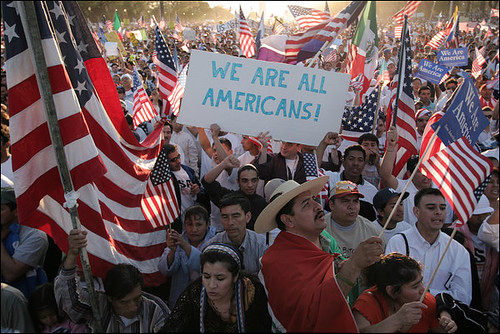Illegal Does Not Mean Invisible
 The Washington Post reports on the marches that have taken place both here on The Mall and in other cities, large and small, across the country.
The Washington Post reports on the marches that have taken place both here on The Mall and in other cities, large and small, across the country.
These peaceful demonstrations in Washington, New York, Phoenix, LA and many other cities all had the backing (at least partially) of three out of five Americans. By that margin, American citizens "favor providing illegal immigrants who have lived here for years a way to gain legal status and eventual citizenship." This sentiment receives support from a majority of Independents, Democrats, and Republicans.
This brings us to the real meat of the story.
Republicans have chosen to have this debate right now. Their bills in the House and Senate, though hugely different, have the same purpose: Make immigration the wedge issue for the 2006 elections. Use 9/11 (and thus national security) as the fulcrum to tip people towards the GOP. Rely on low level racism and fear to win elections. Has this been a miscalculation? The Washington Post reports that only "one in five Americans embraced the House bill, which includes no guest-worker program and would make felons out of those in this country illegally."
This seems like a losing issue for the Republicans. The racist wing-nut base will be expecting a 'throw 'em all back' approach, including walls, fences and 'shoot on sight' measures. Business interests, already reaping the benefits of the cheap labor that illegal aliens provide (cough, Wal*Mart, cough) are not going to sit by and watch their profits be cut. In addition to angering one subset of 'the base' Republicans will, without a doubt, offend a lot of Hispanic voters.
Bush has split with the leadership of his Party, at least in the House. This public confrontation will do little to either increase Bush's popularity or decrease the 'lame duck' affect. If nothing else, it forever kills the idea that Bush can push anything he wants through the Congress.
"Hoy, marchamos; mañana, votamos."
The Washington Post, in their article about the Mall March specifically, makes the most important observation:
For many, the rally was their first political experience. Ranks of young men who listened in respectful silence, high-school students taking advantage of their spring break, immigrant mothers arriving with young children and day laborers who live in fear of deportation turned out in force.This is the formative political experiende for many. To have that experience in opposition to a Republican Congress, a Republican President, and a Republican Bill is not good news for Republicans. It's not really good news for Democrats either, unless they can play some catch-up, be brave enough to drop the weaker brother mentality that'splaguedd them lately.
"Every Hispanic has to stand up. Every person who believes in justice has to stand up," said Anna Torres, 38, a federal worker from Mount Pleasant in Northwest Washington who brought along her sons, Joseph, 6, and Jeremy, 8. They were waiting to be joined by their father, who came here from Guatemala 15 years ago and is still an illegal resident.
Dems must stand up and say that people brave enough and strong enough to pick up and leave everything they've ever known, their friends and their families, to embark on a dangerous journey for only a chance at working hard and at a better life is exactly the kind of people that made America great in the past and are the ones we want to keep America great in the future.
The movement has started and it is one that Progressives, Liberals and Democrats should be strongly behind if not leading from the front.
"This is just the beginning," said Elmer Palmer, 30, of Woodbridge, a real estate agent originally from El Salvador. "If we don't have a fair response to this, we'll continue, greater and greater."No society that has ever built a wall around itself has long survived. A wall didn't keep the Mongol Hordes out of China or keep the Communists in East Berlin. The walled cities of the Dark Ages didn't encourage trade, either of goods and service or ideas and they stagnated.
Palmer pumped a sign above his head that read, in Spanish, "If you deport me, who will build the wall?"
Photo Credit to the Washington Post and Sarah L. Voisi.
Immigration Republicans






No comments:
Post a Comment